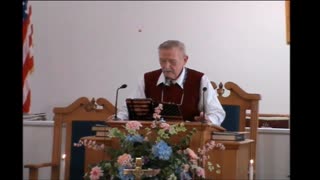Premium Only Content

The Dodgers shock Christian fans with latest move What you didn't know#lgbtq #endtimes#trans#shorts
Last month, the Los Angeles Dodgers created a ruckus when the team announced it would invite a group of LGBTQ self-styled nuns called the Sisters of Perpetual Indulgence to receive an award on Pride Night, June 16. Some enraged Catholic groups and players noted the Sisters’ reputation for “making fun of a religion” and successfully pressured the Dodgers to disinvite the group — only for the Dodgers to do an about-face and reinvite them.
The Sisters of Perpetual Indulgence reimagine the church and its traditions and perform parodies of gender and sexuality, actions that have long drawn contempt from their detractors. But the group’s history also includes important community work that has been equally, if not more, divisive than their clothing.
While the fervor over the Sisters’ inclusion during Pride Night is tied to a rise in anti-LGBTQ lobbying, it is also rooted in the Catholic Church’s long-held rules against the use and promotion of contraceptives and the fact that the Sisters of Perpetual Indulgence were the vanguard of safe-sex education during the AIDS epidemic.
On Easter weekend 1979, a group of gay men in San Francisco donned nuns’ habits and traversed the city. Driven by boredom and by frustration with the hyper-butch “Castro clone” look that permeated the gay community — which consisted of Levi’s jeans and leather, a muscular physique and a mustache — they wore attire that challenged the status quo.
A founding member known as Sister Vicious Power Hungry Bitch explained how the major attention the Sisters received shaped their work: “We should use it as a tool for social change, for the change that we want to see.” That summer, she and four other founders — Sister Missionary Position, Reverend Mother, the Abbess and Sister Hysterectoria — created that change by forming the Sisters of Perpetual Indulgence “to promulgate universal joy and expiate stigmatic guilt.”
Over the years, the Sisters grew in number in San Francisco and outside the city, with over 40 chapters in the United States and 20 more abroad. The Sisters could be spotted at gay protests, marches, fundraisers and faith events. Over time, they expanded their mission to include a devotion “to community service, ministry and outreach to those on the edges, and to promoting human rights, respect for diversity and spiritual enlightenment.”
-
 0:59
0:59
PragerU
1 year agoThe Dodgers Don't Want Christian Fans
3.83K11 -
 13:57
13:57
Kdubtru
1 year ago"Target's Latest Move That Will SHOCK You..."
11 -
 6:02
6:02
iStealthG4mes
1 year agoWhat You Didn't Know About Blackbirds
2 -
 34:16
34:16
Pastor
1 year agoWhat is a Christian
25 -
 0:38
0:38
Political Power Play Clips
1 year agoBiden Tape Uncovered: What You Didn't Know
4 -
 0:47
0:47
Shorts5700
1 year agoWhat You Didn't Know About Judging Others
9 -
 23:55
23:55
CartierFamily
3 days agoElon & Vivek TRIGGER Congress as DOGE SHUTS DOWN Government
123K143 -
 5:43:44
5:43:44
Scammer Payback
2 days agoCalling Scammers Live
198K26 -
 18:38
18:38
VSiNLive
2 days agoProfessional Gambler Steve Fezzik LOVES this UNDERVALUED Point Spread!
145K17 -
 LIVE
LIVE
Right Side Broadcasting Network
10 days agoLIVE REPLAY: President Donald J. Trump Keynotes TPUSA’s AmFest 2024 Conference - 12/22/24
2,707 watching